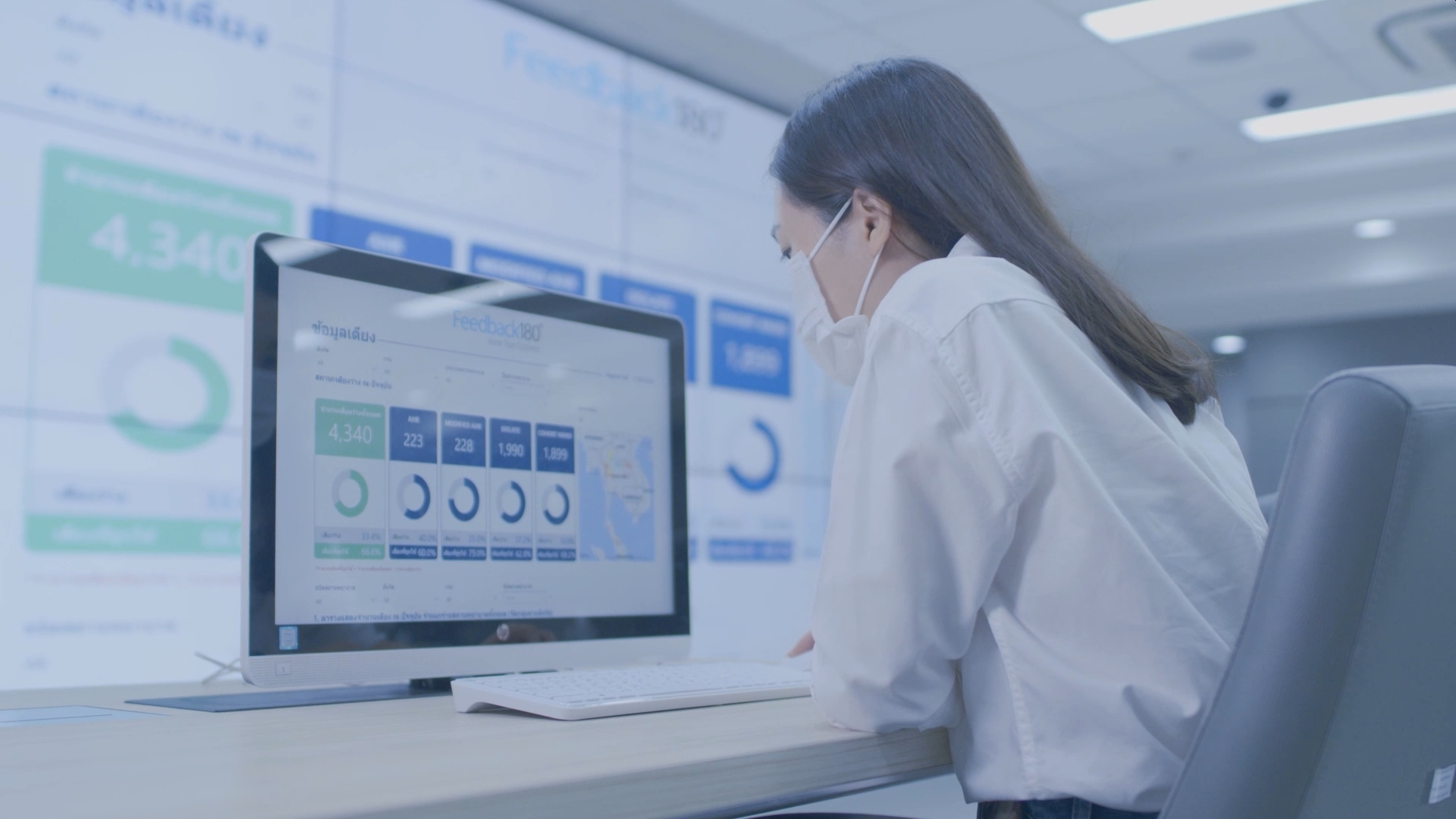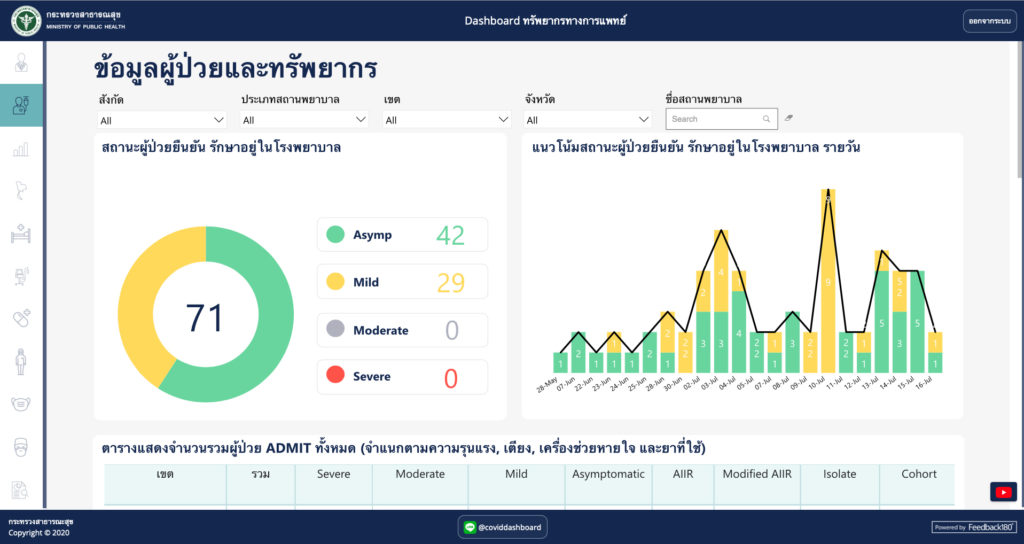Central dashboard boosts agility in containing the pandemic across 966 hospitals nationwide, lays groundwork for further development under National Healthcare Center initiative
Bangkok, 15 September 2020 – The Ministry of Public Health has adopted a data-driven strategy in its fight against COVID-19 by joining forces with Microsoft (Thailand) Limited and Thai startup Feedback180 to create an innovative solution that brings together data from all relevant sources and drives the work of medical personnel across the country. This solution allows the Ministry to switch to a proactive stance as it works to strengthen Thailand’s confidence and restore normalcy.
 Dr. Sukhum Karnchanapimai, Permanent Secretary, Ministry of Public Health, said, “The primary goals of the Ministry in dealing with COVID-19 include containment of the pandemic, accurate diagnosis of symptoms in potentially infected patients, and timely treatment of those who are confirmed to be infected. We are also responsible for providing necessary resources for healthcare professionals and all patients – from medical supplies that doctors and nurses can utilize to adequate manpower to cope with outbreaks in each area.”
Dr. Sukhum Karnchanapimai, Permanent Secretary, Ministry of Public Health, said, “The primary goals of the Ministry in dealing with COVID-19 include containment of the pandemic, accurate diagnosis of symptoms in potentially infected patients, and timely treatment of those who are confirmed to be infected. We are also responsible for providing necessary resources for healthcare professionals and all patients – from medical supplies that doctors and nurses can utilize to adequate manpower to cope with outbreaks in each area.”
“The Office of the Permanent Secretary, Ministry of Public Health, has placed great importance on ensuring availability of these resources for all parties. We have focused our efforts on gathering real-time operational data that would inform hospitals and medical service units of the supply situation in each location. Gathering all the relevant data from across the country represents a significant challenge, and this drove us to bring technology into the picture in order to turn a project that could take years to gather data and develop into one that can respond promptly to changing circumstances with less than one month of development time.”
Ministry of Public Health adopts proactive stance through partnership with Thai startup to tackle COVID-19 with power of data
To meet this challenge, the Ministry worked with Thai startup Feedback180 – an expert in business data analytics – to develop a central dashboard that tracks data on medical equipment and supplies nationwide, allowing hospitals and related organizations to better respond to changing circumstances in every day. The dashboard is based on Power BI, a Microsoft data analytics tool, and runs on the Microsoft Azure cloud for maximum performance and flexibility.
Dhanawat Suthumpun, Managing Director, Microsoft (Thailand) Limited, added: “This global pandemic is an unprecedented event that affects everyone on the planet. The severity of the situation has also amplified the significance of technology as the key factor that enables us to overcome new obstacles in these times of change. At Microsoft, we are deeply grateful for the incredible efforts of medical personnel in Thailand and around the world as they fight on the frontlines to contain the spread of COVID-19 and save lives, and we are fully committed to supporting them with technology that helps ensure a steady flow of supply and manpower where they are needed most.”
“This partnership presented a great opportunity for us to bring in new ways to work and collaborate across organizations while using data as a source of intelligence. We are pleased to leverage the full Microsoft technology stack – from Azure cloud computing, AI capabilities, and Power BI – to empower this mission for the safety of Thai people.”
Sample screenshot from the COVID-19 dashboard
(Sample data only – not representative of real-world data in the system)
Since the project’s initiation in mid-March, every party has developed the dashboard in parallel with actual use in real-world situations. The development and deployment processes can be divided into three major phases:
Phase 1: Gathering data from all sources and formats accessible to the Ministry of Public Health – including sources such as the Department of Medical Services, Department of Disease Control and the Centre for COVID-19 Situation Administration (CCSA). This data is then displayed in a single system after undergoing conversion to appropriate formats for the system’s purpose – including easy visualization.
Phase 2: Verifying data accuracy and initiating availability and demand forecasts for medical supplies and personnel. This required the integration of data on the use of medical equipment, medicinal supplies, and workforce requirements from each local hospital, followed by comparison and analysis against existing resource information, the result is all sectors can acknowledge which hospital in any area have enough supplement necessary storage with the time period for the items operation or a shortage of doctors and nurses in the risk areas.
Phase 3 (current phase): Analysis of patient data to assess future situation. For example, statistics on patient symptoms can inform predictions on the number of patients who will need to be admitted to the ICU, allowing hospitals to prepare themselves accordingly and take timely action to save patients’ lives.
Yongyuth Songsiridej, Chief Executive Officer of Feedback180, added further: “The incredible impact of data in our digital world is a fact that we all understand, which is why the Office of the Permanent Secretary began working with us very early on to bring together data from multiple sources and formats and present it all in a clear, comprehensible manner. This enables us to read the situation from new perspectives and drive change in society. This project builds upon our expertise in creating new experiences with data. The dashboard can provide visibility of the situation from both the supply and demand perspectives, enabling the Office of the Permanent Secretary to see the big picture as things stand in this moment and develop the best guidelines and policies that can drive Thailand towards normalcy as soon as possible.”
In addition to data capabilities, the dashboard also offers other features such as OTP authentication for access control and situation updates via a LINE@ account.
The platform is currently used daily by more than 1,500 medical professionals and officials with data covering 966 hospitals across the nationwide. It also plays a key role in supporting the Ministry of Public Health and related government agencies in planning post-lockdown mitigation measures that allowed businesses to resume operations with confidence and drove Thailand to international recognition as a leading country in tackling the global pandemic.


